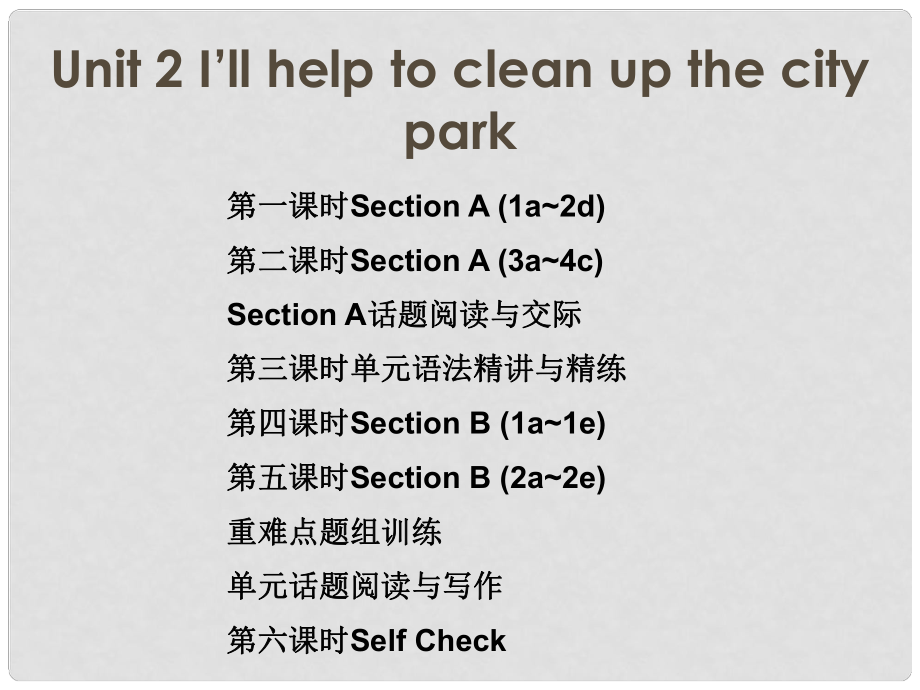《八年級(jí)英語(yǔ)下冊(cè) 隨堂特訓(xùn) Unit 2 I’ll help to clean up the city park課件 (新版)人教新目標(biāo)版》由會(huì)員分享�,可在線閱讀,更多相關(guān)《八年級(jí)英語(yǔ)下冊(cè) 隨堂特訓(xùn) Unit 2 I’ll help to clean up the city park課件 (新版)人教新目標(biāo)版(57頁(yè)珍藏版)》請(qǐng)?jiān)谘b配圖網(wǎng)上搜索�。
1、Unit 2 Ill help to clean up the city park第一課時(shí)第一課時(shí)Section A (1a2d)第二課時(shí)第二課時(shí)Section A (3a4c)Section A話題閱讀與交際話題閱讀與交際第三課時(shí)單元語(yǔ)法精講與精練第三課時(shí)單元語(yǔ)法精講與精練第四課時(shí)第四課時(shí)Section B (1a1e)第五課時(shí)第五課時(shí)Section B (2a2e)重難點(diǎn)題組訓(xùn)練重難點(diǎn)題組訓(xùn)練單元話題閱讀與寫(xiě)作單元話題閱讀與寫(xiě)作第六課時(shí)第六課時(shí)Self Check一��、四會(huì)單詞第一課時(shí)Section A (1a2d)一���、四會(huì)單詞第一課時(shí)Section A (1a2d)第一課時(shí)Section
2�、A (1a2d)一�����、四會(huì)單詞第一課時(shí)Section A (1a2d)一���、四會(huì)單詞第一課時(shí)Section A (1a2d)一����、四會(huì)單詞第二課時(shí)Section A (3a4c)一、四會(huì)單詞第二課時(shí)Section A (3a4c)一��、四會(huì)單詞第二課時(shí)Section A (3a4c)一���、四會(huì)單詞第二課時(shí)Section A (3a4c)一�、四會(huì)單詞第二課時(shí)Section A (3a4c)一�����、四會(huì)單詞第二課時(shí)Section A (3a4c)Section A話題閱讀與交際話題閱讀與交際一�、四會(huì)單詞Section A話題閱讀與交際話題閱讀與交際一、四會(huì)單詞Section A話題閱讀與交際話題閱讀與交際一���、四
3��、會(huì)單詞Section A話題閱讀與交際話題閱讀與交際一��、四會(huì)單詞Section A話題閱讀與交際話題閱讀與交際一、四會(huì)單詞Section A話題閱讀與交際話題閱讀與交際一���、四會(huì)單詞Section A話題閱讀與交際話題閱讀與交際一�、四會(huì)單詞第三課時(shí)單元語(yǔ)法精講與精練第三課時(shí)單元語(yǔ)法精講與精練單元語(yǔ)法精講單元語(yǔ)法精講一、動(dòng)詞不定式 不定式定義:由to+動(dòng)詞原形構(gòu)成���。動(dòng)詞不定式在句中可以作除謂語(yǔ)之外的任何句子成分����。動(dòng)詞不定式畢竟是動(dòng)詞��,所以有動(dòng)詞的屬性����。動(dòng)詞不定式及其短語(yǔ)還可以有自己的賓語(yǔ)、狀語(yǔ)�。1.動(dòng)詞不定式的否定形式由“not+動(dòng)詞不定式”構(gòu)成。2.動(dòng)詞不定式可以和what,which,how,
4����、where,when等連用。3.不帶to的情況����。有一些動(dòng)詞用作賓語(yǔ)補(bǔ)足語(yǔ)的不定式通常不帶to。這種動(dòng)詞有兩類(lèi):一類(lèi)是感官動(dòng)詞��,如see,hear, watch,feel,notice等���;還有一類(lèi)是使役動(dòng)詞���,如help, make,have等。二��、動(dòng)詞短語(yǔ)英語(yǔ)中有些動(dòng)詞可以和一些別的詞構(gòu)成動(dòng)詞短語(yǔ)��,表達(dá)一個(gè)概念�����,其作用與一個(gè)單獨(dú)的動(dòng)詞差不多�,這種形式的組合,我們稱為動(dòng)詞短語(yǔ)或短語(yǔ)動(dòng)詞��。第三課時(shí)單元語(yǔ)法精講與精練第三課時(shí)單元語(yǔ)法精講與精練單元語(yǔ)法精講單元語(yǔ)法精講動(dòng)詞短語(yǔ)的構(gòu)成:(1)“動(dòng)詞+副詞”����,這種結(jié)構(gòu)在英語(yǔ)中使用十分廣泛,如果后面接代詞作賓語(yǔ)時(shí)���,只能放在動(dòng)詞和副詞之間���;如果接名詞,可以放在動(dòng)
5�、詞和副詞之間,也可以放在他們的后面��。常見(jiàn)的有:fix up,look up,make up,pick up,take up,clean up,cheer up,等等���。(2)“動(dòng)詞+介詞”����,其后可以跟名詞�����、代詞���、動(dòng)名詞等�。常見(jiàn)的有:look after,take after,care for,look for,look at等��。(3)“動(dòng)詞+副詞+介詞”�����,常見(jiàn)的有:put up with,do away with,look forward to等。(4)“動(dòng)詞+名詞+介詞”�,常見(jiàn)的有:take care of,pay attention to,have a look at等。(5)“be+形容詞
6����、+介詞”,常見(jiàn)的有:be used to,be angry with,be strict with,be good at,be afraid of,be ready to等�����。第三課時(shí)單元語(yǔ)法精講與精練第三課時(shí)單元語(yǔ)法精講與精練單元語(yǔ)法精練單元語(yǔ)法精練一����、四會(huì)單詞第三課時(shí)單元語(yǔ)法精講與精練第三課時(shí)單元語(yǔ)法精講與精練單元語(yǔ)法精練單元語(yǔ)法精練一、四會(huì)單詞第三課時(shí)單元語(yǔ)法精講與精練第三課時(shí)單元語(yǔ)法精講與精練單元語(yǔ)法精練單元語(yǔ)法精練一���、四會(huì)單詞第四課時(shí)Section B (1a1e)一����、四會(huì)單詞第四課時(shí)Section B (1a1e)一���、四會(huì)單詞第四課時(shí)Section B (1a1e)一��、四會(huì)單詞第四課
7��、時(shí)Section B (1a1e)一����、四會(huì)單詞第四課時(shí)Section B (1a1e)一、四會(huì)單詞第四課時(shí)Section B (1a1e)一���、四會(huì)單詞第五課時(shí)Section B (2a2e)一、四會(huì)單詞第五課時(shí)Section B (2a2e)一��、四會(huì)單詞第五課時(shí)Section B (2a2e)一���、四會(huì)單詞第五課時(shí)Section B (2a2e)一���、四會(huì)單詞第五課時(shí)Section B (2a2e)一、四會(huì)單詞第五課時(shí)Section B (2a2e)一����、四會(huì)單詞重難點(diǎn)題組訓(xùn)練重難點(diǎn)題組訓(xùn)練一、單項(xiàng)選擇�。( )1.The boy is making a about the activity.A.ne
8、wsB.situationC.noticeD.information( )2.She walked so quietly that we didnt her.A.wakeB.noticeC.causeD.refuse( )3.Did you notice someone at you?A.laughB.to laughC.laughingD.laughs( )4.We noticed the girl the room from the back door.A.enterB.to enterC.enteringD.enters二��、根據(jù)漢語(yǔ)意思完成句子,每空一詞����。5.剛才我注意到他站在我后面。I
9��、 noticed him behind me just now.6.我注意到她正在房間跳舞��。I noticed her in the room.CBCAstand dancing 重難點(diǎn)題組訓(xùn)練重難點(diǎn)題組訓(xùn)練一���、單項(xiàng)選擇����。( )1.What news!The Chinese Womens Volleyball Team won the Olympic gold medal.Really?Thats great!A.interestingB.interestedC.excitingD.excited( )2.I think the book Harry Potter is very .I wan
10�、t to read it again.A.boringB.excitingC.boredD.excited( )3.All the students felt after hearing the story.A.excited;excitedB.excited;excitingC.exciting;excitedD.exciting;exciting( )4.The news makes everyone .A.excitedB.nervousC.happilyD.luckily二、根據(jù)句意����,用excited或exciting填空。5.The students were when they w
11���、on the first place.6.He was so when he heard the news that he got the first prize in the contest.CBBAexcited excited exciting 重難點(diǎn)題組訓(xùn)練重難點(diǎn)題組訓(xùn)練一�����、單項(xiàng)選擇��。( )1.My grandparents live in the countryside by themselves,but they dont feel .A.lonelyB.aloneC.excitedD.surprised( )2.Though he is at home,he doesnt fee
12�����、l .A.alone;lonelyB.lonely;aloneC.lonely;lonelyD.alone;alone( )3.My uncle is an outgoing man.Yes,although he lives ,he never feels.A.lonely;aloneB.alone;lonelyC.alone;aloneD.lonely;lonely二�、根據(jù)句意,用alone或lonely填空��。4.The boy did his homework with the help of his friends in the past.But now he can do it .5
13�����、.The man felt after his wife died.AABalonelonely 重難點(diǎn)題組訓(xùn)練重難點(diǎn)題組訓(xùn)練一��、單項(xiàng)選擇�����。( )1.Can you what it would be like in the future?A.thinkB.imagineC.agreeD.tell( )2.Look! Shes running so fast!Its hard to her legs were once broken.A.knowB.findC.imagineD.see( )3.I can hardly imagine Tom the hard work in five days
14��、.A.finishB.to finishC.finishesD.finishing三�、根據(jù)漢語(yǔ)意思完成句子����,每空一詞�����。4.想象一下沒(méi)有電腦的生活���。life without computers.5.試想一下生活在月球上。Try to on the moon.BCDImagine imagine living 單元閱讀與寫(xiě)作單元閱讀與寫(xiě)作單元閱讀單元閱讀一�、四會(huì)單詞單元閱讀與寫(xiě)作單元閱讀與寫(xiě)作單元閱讀單元閱讀一、四會(huì)單詞單元閱讀與寫(xiě)作單元閱讀與寫(xiě)作單元閱讀單元閱讀一��、四會(huì)單詞單元閱讀與寫(xiě)作單元閱讀與寫(xiě)作單元寫(xiě)作單元寫(xiě)作單元閱讀與寫(xiě)作單元閱讀與寫(xiě)作單元寫(xiě)作單元寫(xiě)作一��、四會(huì)單詞單元閱讀與寫(xiě)作單元閱讀與寫(xiě)作單元寫(xiě)作單元寫(xiě)作【參考范文】第六課時(shí)Self Check一���、四會(huì)單詞第六課時(shí)Self Check一�����、四會(huì)單詞第六課時(shí)Self Check一�、四會(huì)單詞第六課時(shí)Self Check一�、四會(huì)單詞第六課時(shí)Self Check一、四會(huì)單詞第六課時(shí)Self Check一�、四會(huì)單詞第六課時(shí)Self Check一�����、四會(huì)單詞第六課時(shí)Self Check一���、四會(huì)單詞第六課時(shí)Self Check一、四會(huì)單詞第六課時(shí)Self Check一���、四會(huì)單詞第六課時(shí)Self Check一�、四會(huì)單詞
 八年級(jí)英語(yǔ)下冊(cè) 隨堂特訓(xùn) Unit 2 I’ll help to clean up the city park課件 (新版)人教新目標(biāo)版
八年級(jí)英語(yǔ)下冊(cè) 隨堂特訓(xùn) Unit 2 I’ll help to clean up the city park課件 (新版)人教新目標(biāo)版

